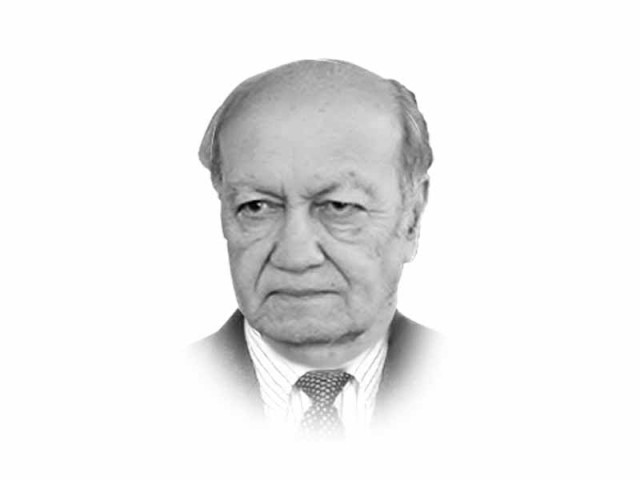Challenges facing India-Pakistan relations
India and Pakistan's role during the pre- and post-withdrawal period of US forces from Afghanistan will be critical.

The writer is a retired lieutenant general of the Pakistan Army and served as chairman of the Pakistan Ordnance Factories Board
Nonetheless, both countries, at least on matters of commerce, now stand committed to move on a fast track. Recently, when the commerce ministers of India and Pakistan met in New Delhi, they took some important decisions to establish normal trading relations and undertake liberalisation and facilitation measures. Important among these was the one to keep the Wagah-Attari border functional round the clock, introduce containerisation of cargo and provide Non-Discriminatory Market Access on a reciprocal basis. The latter is meant as a stop-gap arrangement to overcome the psychological barrier associated with the MFN (Most Favoured Nation) acronym. In March 2012, Pakistan moved from the ‘Positive List’ to the ‘Negative List’ and placed 1,209 items out of over 8,000 product lines that could be imported from India. In addition, the business community of both countries has stepped up their interactions and an exhibition of Indian goods is planned for the middle of next month in Lahore, which is likely to be attended by the Indian commerce minister.
Perhaps, what many are unaware of is that India-Pakistan trade is still below the 1947 and 1965 levels. This should serve as a reminder to the leaders of both countries that unless there is progress on a broad front of issues, it may be difficult to sustain progress in trade and commerce.
The fragility of the relationship could be gauged by the recent volatility on the Line of Control (LoC) that lasted over a year and only stabilised when the two prime ministers, Nawaz Sharif and Manmohan Singh, met on the sidelines of the UN to cool the tensions. This clearly demonstrates that the situation on the LoC is symptomatic of the overall political relationship.
The conduct of the two militaries is crucial in moving towards an enduring, positive relationship. It seems that the Indian military has become a major determinant in India-Pakistan relations. Recent aggressive statements against Pakistan by the Indian chief of army staff and the army’s veto on any agreement on Siachen, other than maintaining the status quo, reflect the increasing role of the military in political affairs and reinforce the assumption that the political leadership in India is yielding space to men in uniform. This may well be a consequence of the increasing role of the military in Jammu & Kashmir and in the Maoists-led insurgencies. This seems ironic, as while in Pakistan, the army, which has historically been a dominant power, is distancing itself from politics, the Indian military is gradually asserting itself.
Progress on major issues — Kashmir, Siachen and Sir Creek — is unlikely. In any case, with the Indian elections as close as May 2014, no major policy decisions are expected. The election results should be completed within a month. Probably by September 2014, the new Indian government will be in a position to define its relations with Pakistan and no progress can be expected until then. Much would depend on which party wins but with the Congress party’s abysmal performance, the BJP seems to be the front runner, with Narendra Modi, the current chief minister of Gujarat, as the prospective prime minister.
Modi is a hardliner and carries a stigma of the horrible massacre of Muslims in February 2002, in which over 1,000 Muslims died. But having improved the economy of Gujarat and known to be business-friendly, he has the full backing of India’s corporate world and right-wing political parties. Modi is, however, very divisive and controversial. The world will be closely watching him for his treatment of minorities and conduct of relations with India’s neighbours, especially Pakistan.
Modi, during his election campaign, has stated that he will follow a decentralised foreign policy and will consult the states. The idea seems far-fetched and is a reflection of his lack of experience in foreign affairs. In all likelihood, his foreign policy will be dictated not as much by a nationalistic agenda but more by the compulsions of moving the economy. It will take Modi at least two years to give any serious attention to relations with Pakistan and that, too, if he is genuine about it. Nevertheless, Pakistan will have to pay a lot of attention to the new political realities of India.
The emergence of the Aam Aadmi Party has introduced another new element in Indian politics. Its anti-corruption crusade led to the party capturing power in Delhi and the forecasts say that it might win between 50 to 60 seats in the Lok Sabha. It is to be seen to what extent the emergence of a third political force will transform the internal political dynamic of India and affect its attitude towards Pakistan and other neighbours. Interestingly, the party leader, Arvind Kejriwal, has expressed his desire for friendly relations with Pakistan.
Elections in Jammu & Kashmir this year is another major event that will be closely watched by Pakistan for its fairness and representative character. Any effort to manipulate the elections by New Delhi will create unrest among the Kashmiris with sympathetic reverberations in Pakistan.
The role of India and Pakistan during the pre- and post-withdrawal period of the US forces from Afghanistan would also be critical. The general prognosis is that there are slim chances of any reconciliation between Hamid Karzai and the Afghan Taliban, which could lead to a civil war. It would be in the interest of both countries to cooperate in promoting stability in Afghanistan.
Published in The Express Tribune, January 29th, 2014.
Like Opinion & Editorial on Facebook, follow @ETOpEd on Twitter to receive all updates on all our daily pieces.















COMMENTS
Comments are moderated and generally will be posted if they are on-topic and not abusive.
For more information, please see our Comments FAQ